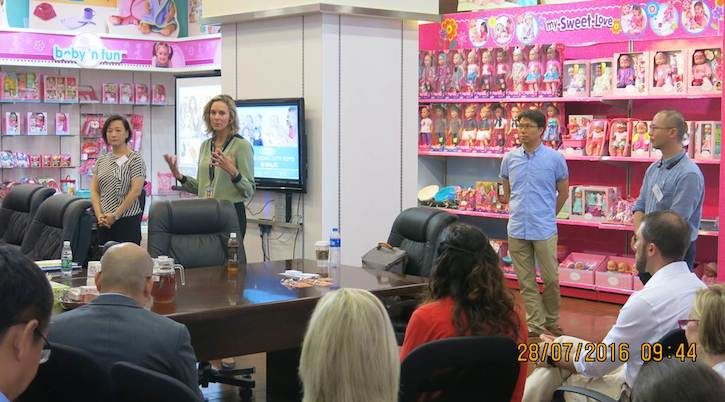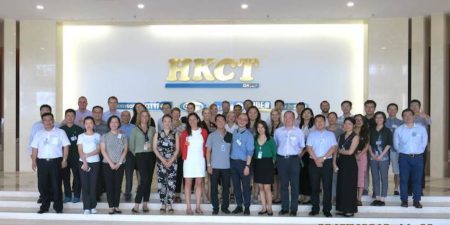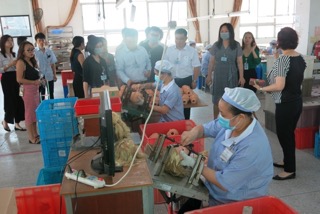
Last month, Walmart, which is a member of the Paulson Institute’s CEO Council for Sustainable Urbanization, announced new plans to reduce emissions by 18 percent and generate half its energy from renewable sources by 2025—both measures the company says make good business sense. With more than 10,000 stores worldwide, Walmart has the potential to meaningfully reduce the environmental impact of the global retail sector. What’s more, Walmart and other CEO Council member companies are collaborating on several sustainable supply chain initiatives to reduce the group’s emissions even more. Walmart’s senior vice president for global sustainability, Laura Phillips, explains below how the company is working toward its sustainability goals, starting in China.
By Laura Phillips
Ten years ago we at Walmart revolutionized our approach to sustainability, creating and implementing a new strategy guided by three long-term aspirational goals: to operate with 100 percent renewable energy, to create zero waste in our own operations, and to sell products that sustain people and the environment.

As we began working towards our 100 percent renewable energy goal, we quickly realized that to be successful we needed to reduce our energy demand through energy efficiency. We found that a focus on reducing our energy intensity in our operations was not only a cost effective way to contribute to our renewable energy goal and reduce emissions. It also improves our bottom line by reducing our annual operating expenses and exposure to increasing energy prices in the future.
Walmart recognizes that addressing energy and emissions across the global supply chain is perhaps even more significant than addressing them in our own operations. In fact, at least 90 percent of our indirect environmental impact is incurred beyond the footprint of our stores and facilities. That’s why we’re engaging directly with suppliers on energy efficiency – with the goal of creating more environmental and business value than would be possible on our own.
While we support energy efficiency across our suppliers’ global operations, we currently consider energy efficiency in Chinese factories a top priority.
Walmart is working with key stakeholders in China – including local non-governmental organizations (NGOs) and suppliers – where we’ve built on experience to create new solutions and models for sustainable growth. Since 2008, we’ve worked with Chinese factories through various programs to help improve energy.

As such, Walmart is acutely aware of the environmental issues facing China today, and we realize we have a great responsibility as a global retailer to continue to help pave the way for sustainable operations in China. In July, Walmart joined representatives from China’s top state-owned and private member companies of the Paulson Institute/CCIEE CEO Council for Sustainable Urbanization for a working-level meeting. The goal of the meeting was to come together as U.S. and Chinese companies, alongside government and NGOs, to continue to develop innovative solutions for China’s sustainability challenges – including the need for efficient energy use in Chinese factories. Walmart led a working-group discussion on the topic, highlighting progress from our Chinese manufacturing energy efficiency program and touring a factory participating in the program.
Two years ago, in August 2014, Walmart announced a new commitment to further strengthen the sustainability of our global supply chain by advancing the energy efficiency of China-based manufacturers. In an effort to promote the responsible use of energy within these factories in our supply chain, Walmart committed to inviting suppliers representing 70 percent of Walmart’s business sourced in China to participate in the program by the end of 2017.
The energy efficiency program provides a tool developed with McKinsey Solutions called the Resource Efficiency Deployment Engine, or “RedE,” a Web-based system of metrics that guides the identification of energy-efficiency improvement initiatives. Since the launch of RedE in 2014, Walmart has trained more than 500 factories to utilize the tool, resulting in the completion of 118 individual factory projects, with reported cost savings of more than $2.8 million and an estimated energy savings of more than 45 million kWh and greenhouse gas (GHG) emissions reduction of more than 33 thousand metric tons. That’s roughly enough energy to power 4,600 American homes for a year — and an emissions reduction equivalent of taking almost 7,000 cars off the road*. In addition to the RedE tool, Walmart has also collaborated with energy experts at Environmental Defense Fund (EDF) to provide in-person and on-site training for Chinese suppliers on the latest energy efficient and renewable technologies to transform energy use in those factories.
While we’re happy with the program’s success to date, we are more excited about the future. Since the launch of our new commitment, we’ve focused heavily on training, and not all of the targeted factories have adopted RedE yet; if they do, and we are able to achieve adoption across the board, we estimate we will achieve a GHG emissions reduction of nearly 1 million metric tons (MMT). Going forward, Walmart’s focus is expected to shift from training factories on use of the RedE tool, to tracking and encouraging improvement in priority areas.
Our goal is to continue collaboration with suppliers, NGOs, government, and members of the CEO Council – in China and across the world – on the path to using energy more efficiently. This program is just one example of how we are equipping our suppliers with the necessary tools to operate their factories in a more environmentally responsible way – ultimately benefiting their bottom line while reducing emissions.
Laura Phillips is Walmart’s Senior Vice President, Sustainability


